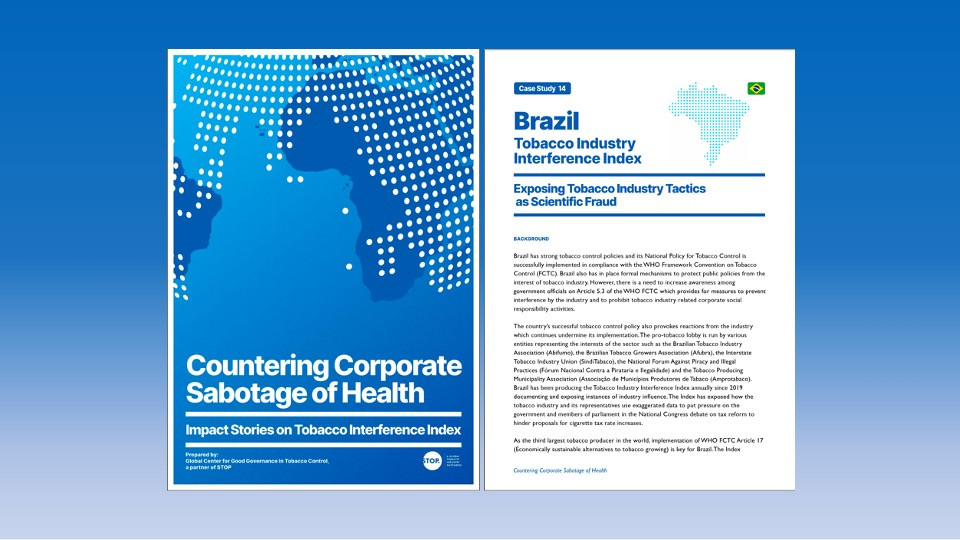Exposing Tobacco Industry Tactics as Scientific Fraud

“Brazil’s successful tobacco control policy also provokes strong reactions from the industry. Through the Index we continue to expose how the tobacco industry and its representatives intervene to undermines the implementation of our strong laws.”
Mariana Pinho
ACT Health Promotion (ACT)
Background
Brazil has strong tobacco control policies and its National Policy for Tobacco Control is successfully implemented in compliance with the WHO Framework Convention on Tobacco Control (FCTC). Brazil also has in place formal mechanisms to protect public policies from the interest of tobacco industry. However, there is a need to increase awareness among government officials on Article 5.3 of the WHO FCTC which provides for measures to prevent interference by the industry and to prohibit tobacco industry related corporate social responsibility activities.
The country’s successful tobacco control policy also provokes reactions from the industry which continues undermine its implementation. The pro-tobacco lobby is run by various entities representing the interests of the sector such as the Brazilian Tobacco Industry Association (Abifumo), the Brazilian Tobacco Growers Association (Afubra), the Interstate Tobacco Industry Union (SindiTabaco), the National Forum Against Piracy and Illegal Practices (Fórum Nacional Contra a Pirataria e Ilegalidade) and the Tobacco Producing Municipality Association (Associação de Municípios Produtores de Tabaco (Amprotabaco).
Brazil has been producing the Tobacco Industry Interference Index annually since 2019 documenting and exposing instances of industry influence. The Index has exposed how the tobacco industry and its representatives use exaggerated data to put pressure on the government and members of parliament in the National Congress debate on tax reform to hinder proposals for cigarette tax rate increases.
As the third largest tobacco producer in the world, implementation of WHO FCTC Article 17 (Economically sustainable alternatives to tobacco growing) is key for Brazil. The Index documented how the National Program for Diversification in Tobacco Farming Areas, which should have started in 2019 by the Ministry of Agriculture, Livestock and Supply (MAPA) through the Family Farming and Cooperatives Secretariat (SAF), is facing a challenge since the main representative defends tobacco production and production chain development.
For example, in the build-up to COP9, the Index documented how the Sectorial Chamber of the tobacco production chain within the Ministry of Agriculture delivered a document to the Ministry of Foreign Affairs urging them to consider “the point of view of the tobacco production chain” and act “to ensure COP 9 does not result in harm” to their interests.[i]
Launch of the Index
A major highlight of the 2021 Brazilian Index is the way in which it was disseminated. ACT Health Promotion partnered with a team of investigative journalists, Ciência Suja (Dirty Science), that discusses scientific frauds and the spread of misinformation. The Index was presented through the following episodes:
- Podcast: Tobacco industry in the 21st century: new faces, old practices (Dec 16, 2021)[ii]
- Live stream: New strategies of the tobacco industry to subvert science (Dec 9, 2021)[iii]
- Live stream: Nicotine - the real product of the tobacco industry (Jan 12, 2022)[iv]
- Live stream: Smoking and the Covid-19 pandemic (Feb 17, 2022)[v]
The format for disseminating the Index through a podcast broadened the audience which previously was via the traditional press, social media followers and partners. In addition, the goal of Dirty Science suggests that their audience are those who are interested in revealing scientific fraud that caused great damage to society - which is closely related to the modus operandi of tobacco companies.
ACT invited digital influencers for the Index launch who shared tweets which reached more than 5,000 impressions and Dirty Science reached more than 15,000 impressions on the launch in Instagram in Dec 9th, 2021. ACT also wrote a blog[vi] which was promoted by the Observatory on Strategies of the Tobacco Industry/Fiocruz.
Advocacy with the Index
In January 2022, ACT sent the Index to the Executive Secretariat of the National Committee for FCTC Implementation, which has 18 government representatives, highlighting the recommendations and proposed disseminating it. In addition, ACT was invited to present the findings of the Brazil Index during the launch the Mexican Index.[vii]
The Index has Enhanced Monitoring
The continuity of the annual Brazilian Index has stimulated industry monitoring of the ACT Health Promotion, receiving recognition of its work. The main benefit of the Index is it exposes tactics of tobacco companies and their allies and provides a platform to urge the authorities to comply with their commitments and obligations under the WHO FCTC.
About ACT Health Promotion: ACT aims to strengthen civil society capacity to advocate for the full implementation of the Brazilian Strategic Action Plan to tackle NCDs as well as to improve the capacity to link global commitments with national goals, supporting strong international commitments for public health and sustainable development.
[i] Mathias M. Tobacco lobby attacks key anti-tobacco policy committee. 30 September 2021. Available from: https://bit.ly/3wQwrX9
[ii] Ciência Suja. Available from: https://bit.ly/3LTJuwq
[iii] Ciência Suja. Instagram Post. Available from: https://bit.ly/39tfXwB
[iv] Ciência Suja. Instagram Post. Available from: https://bit.ly/3MTWxhW
[v] Ciência Suja. Instagram Post. Available from: https://bit.ly/3O7NlYU\
[vi] Pinho, M. ACT Blog.13 December 202. Available from: https://bit.ly/3mTfyXp
[vii] Senado de Mexico. Presentación del “Reporte Índice Regional: Interferencia de las tabacaleras en México 2021’ (Youtube Video). Available from: https://bit.ly/3xYQJPV
